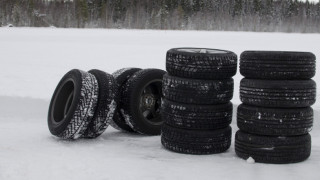
What’s The Difference Between Normal And Winter Tyres?
Considering winter tyres for your vehicle? It’s a common question among drivers as the seasons change. This comprehensive guide will discuss the key differences between winter and summer tyres, their benefits, drawbacks, and investment worth.
 Winter Tyres vs Summer Tyres: The Key Differences
Winter Tyres vs Summer Tyres: The Key Differences
The primary distinction between winter tyres and summer tyres, often inaccurately referred to as ‘normal’ tyres, is largely centred around tread pattern and density. Winter tyres sport a unique tread pattern featuring wider and deeper grooves in comparison to summer tyres, improving grip and handling in wintry conditions.
Moreover, winter tyres are constructed with a larger proportion of natural rubber and silica, a compound that remains supple and flexible in colder temperatures, a stark contrast to the synthetic rubber found in summer tyres that hardens when the temperature drops. This unique composition helps winter tyres maintain excellent traction even in the harshest winter conditions.
The Advantages of Winter Tyres
Winter tyres shine in snowy or icy conditions, thanks to their special tread pattern designed to grip better on winter roads. The softer compound of winter tyres, remaining flexible in lower temperatures, provides the necessary grip for safer and more comfortable winter driving.
Summer tyres, while proficient in temperatures above 7 degrees Celsius, struggle to offer the same level of grip when the thermometer dips due to the hardening of their compound. This differential performance of summer and winter tyres becomes a significant factor when considering the switch for the colder months.
One of the standout benefits of winter tyres is their impact on stopping distances. According to research by Continental, a leading tyre manufacturer, a car fitted with winter tyres travelling at a speed of 30mph will come to a complete stop on a snow-covered road 8 metres sooner than a car with summer tyres. That’s an additional two car lengths before the car with summer tyres can safely stop, a critical difference when it comes to avoiding potential accidents.
 Winter vs Summer Tyres: An Insight Into Run Flat Options
Winter vs Summer Tyres: An Insight Into Run Flat Options
Run flat tyres are increasingly popular due to their resilience against punctures, allowing drivers to reach a garage without the immediate need for tyre replacement. Now, imagine combining these benefits with the advantages of winter tyres — that’s precisely what run flat winter tyres offer.
Though pricier, run-flat winter tyres offer drivers the optimal blend of winter tyre safety and the convenience of run-flat technology. If safety and convenience are your top priorities, these tyres might be a worthy consideration.
Evaluating Winter Tyres Investment in the UK
While winter tyres do come with a slightly higher price tag compared to standard tyres, the additional safety benefits they provide from October through March far outweigh the additional cost. Moreover, having two sets of tyres for the year (one for summer and another for winter) can extend the life of each set, as each is used only half of the time, making this a cost-effective investment in the long run.
At MQ Mobile Tyres, we offer an extensive selection of winter tyres suitable for a wide range of vehicle makes and models. We also offer off-season tyre storage at a nominal cost. With the growing demand for winter tyres, we recommend placing your order sooner rather than later to secure your set.
Frequently Asked Questions (FAQs)
1. Is it worth getting winter tyres in the UK?
Yes, absolutely. Given the UK’s often unpredictable and harsh winter weather conditions, the improved grip, traction and reduced stopping distances provided by winter tyres significantly increase road safety.
2. Is it worth changing to winter tyres?
Indeed, it is. Winter tyres can considerably enhance your vehicle’s performance in cold, icy, or snowy conditions, hence they’re a worthwhile investment.
3. How much of a difference do winter tyres make?
Winter tyres can make a significant difference, especially in terms of road safety during the winter months. They offer better traction and shorter stopping distances in cold conditions than summer tyres, enhancing vehicle handling and reducing the risk of accidents.
4. What are the disadvantages of winter tyres?
Winter tyres can underperform in warmer conditions and may wear out faster if used inappropriately during the summer months, potentially leading to an increase in fuel consumption.
5. Do I need 4 winter tyres or just 2?
It is recommended to install four winter tyres to maintain balanced handling and prevent potential safety issues.
6. Can I use winter tyres all year round in the UK?
While it is technically possible, it’s not recommended due to their reduced performance and accelerated wear in warmer temperatures. Switching back to summer tyres when the temperature consistently exceeds 7 degrees Celsius is advisable.
We hope this comprehensive guide has provided you with the insights you need to make an informed decision about winter tyres. Safe travels!
For more information, advice or to place an order, please get in touch with our team at 01234 327 328.

 Winter Tyres vs Summer Tyres: The Key Differences
Winter Tyres vs Summer Tyres: The Key Differences Winter vs Summer Tyres: An Insight Into Run Flat Options
Winter vs Summer Tyres: An Insight Into Run Flat Options